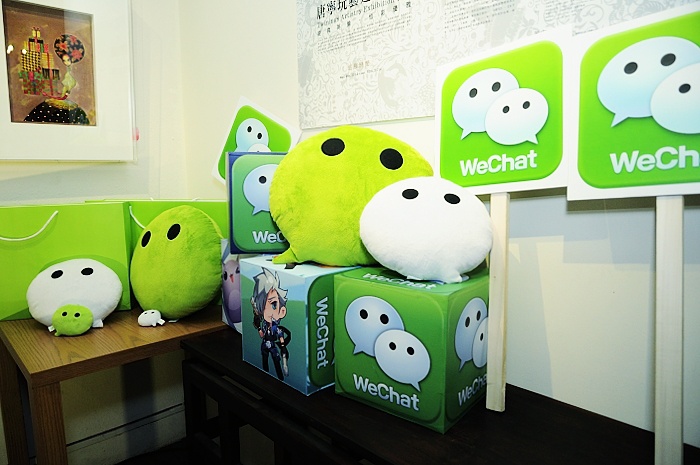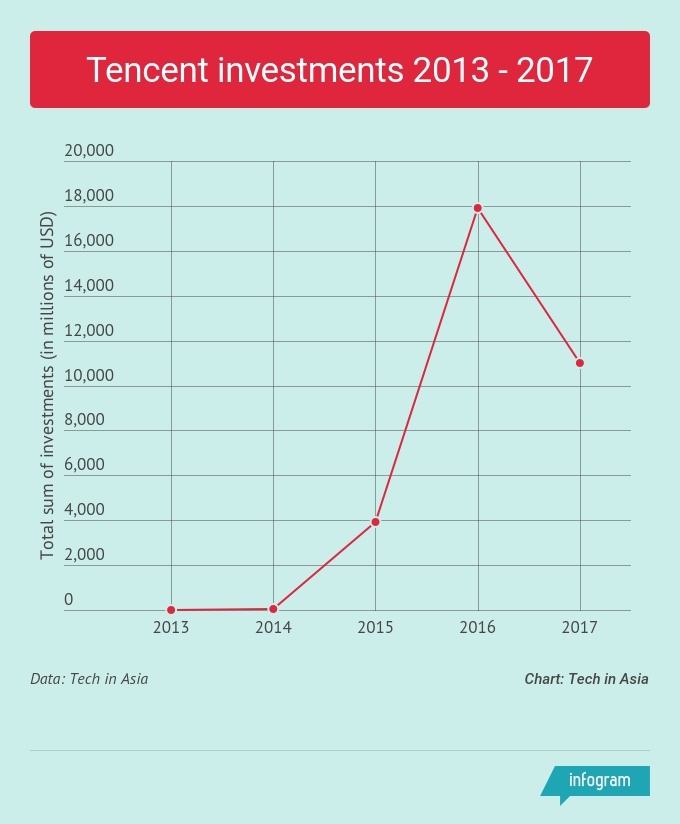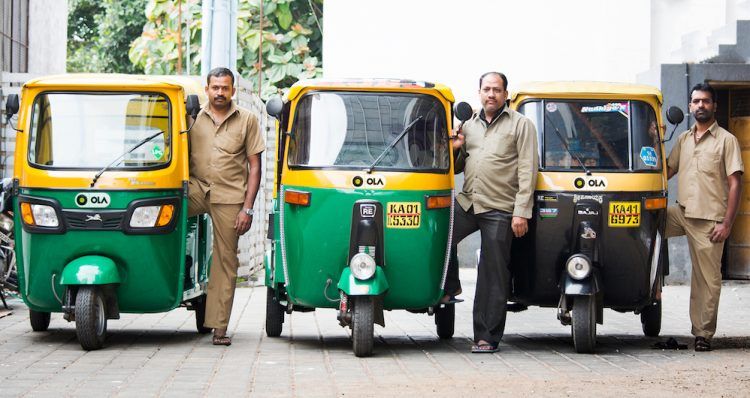
Tencent operates China’s most popular social app: WeChat. Photo credit: Sinchen Lin
Chinese social and gaming giant Tencent had another blockbuster year. Its market capitalization skyrocketed from around US$200 billion to almost half a trillion dollars over the course of 2017 – even surpassing Facebook’s valuation at one point.
A fair bit of that moolah – though less than last year – went to startups. Here are 10 of Tencent’s largest investments in 2017.

Tencent’s investments in startups (excluding acquisitions) jumped into the billions in 2015 and peaked last year at US$17.9 billion.
1. Meituan-Dianping
- Funding round: US$4 billion
- Country: China
Meituan-Dianping is a Yelp-like platform that lets users order food, book events, and cash in on group-buying deals. The company’s services are hooked into WeChat, one of Tencent’s most popular social apps.
According to sources at Reuters, Meituan-Dianping is considering an initial public offering of at least US$3 billion in the US next year.
WeChat’s sprawling ecosystem includes a wide range of different businesses, such as ride hailing, ticket booking, and food delivery. These embedded services, including those offered by Meituan-Dianping, give priority to WeChat Pay, the superapp’s payment system.
Ant Financial’s payment system Alipay is the leading mobile wallet in China, but WeChat Pay has made considerable gains since launching in 2014. Together, they account for about 90 percent of China’s mobile payment market.
2. NIO
- Funding round: US$1.6 billion (two rounds)
- Country: China
Previously known as NextEV, NIO is one of China’s rising electric car startups. Also backed by Baidu, NIO is part of the Chinese titan’s Apollo platform, where self-driving car data and technology is shared between automobile and tech companies.
This year, NIO announced it would develop fully autonomous cars by 2020. In June, the company’s investment arm, NIO Capital, led a US$46 million round for Momenta, a Beijing-based self-driving car software startup.

NIO’s autonomous concept car, EVE. Photo credit: NIO
In addition to NIO, Tencent also holds a 5 percent stake in Tesla. As autonomous driving technology continues to improve, cars could become new platforms for entertainment, content, and consumer-facing services – all right up Tencent’s alley.
3. Flipkart
- Funding round: US$1.4 billion
- Country: India
Flipkart’s US$1.4 billion boost in April was the largest funding round ever raised by any Indian internet company. In addition to Tencent, eBay and Microsoft participated as investors, with the former selling its India business to Flipkart.
This year has seen the consolidation of India’s ecommerce industry, which is turning into a proxy war between Alibaba and Tencent (Amazon is handling things on its own). Alibaba is betting on Paytm’s ecommerce business, Paytm Mall, which split from its payments unit in 2016. Meanwhile, Flipkart is in Tencent’s corner.
4. Ola
- Funding round: US$1.1 billion
- Country: India
Tencent also continued to pour money into the global ride-hailing industry in 2017, following past investments in the ‘anti-Uber alliance’ – China’s Didi Chuxing, US company Lyft, and Go-Jek in Indonesia. In India, Tencent has chosen to back Ola.

Ola auto-rickshaw drivers. Photo credit: Ola
The US$1.1 billion round will help India’s ride-hailing company take on Uber, which has its own enormous warchest and may also receive US$10 billion more from SoftBank and other investors. However, one of the Indian startup’s key advantages is the diversity of services and vehicles it offers, from auto-rickshaws to luxury cars.
5. Mobike

Photo credit: Mobike
- Funding round: US$815 million (two rounds)
- Country: China
Investment is still going strong more than a year after the initial launch of bike-sharing companies in China.
Mobike and Ofo have emerged as the industry’s two largest players, each backed by a tech giant. Tencent has chosen Mobike, while Alibaba and its financial affiliate Ant Financial have picked Ofo.
While the two bike unicorns spent 2016 rolling out as many bikes as possible across cities in China, they have turned their attention overseas this year. To date, both Mobike and Ofo have bikes in over 150 cities around the world, including mainland China.
One advantage that Ant Financial has over WeChat is Sesame Credit, the company’s proprietary credit system. That means users who want to rent Ofo bikes can do so without paying a deposit – if their credit score is high enough, that is.
Tencent Credit is still undergoing beta testing. In November, select users in Guangzhou were able to use it to rent Mobike bikes without plunking down the required US$45 deposit.
6. Yixin Group
- Funding round: US$579 million
- Country: China
Yixin Group runs an online car retail platform that connects consumers with different car-related companies and services, such as auto dealers and loans for both new and secondhand vehicles.
Apart from Tencent, the startup also counts Baidu and JD, Alibaba’s domestic ecommerce archrival, as its backers. In November, Yixin raised US$867 million when it went public on the Hong Kong stock exchange.
7. Kuaishou
- Funding round: US$350 million
- Country: China
Kuaishou is a live streaming app that’s gained traction in China’s smaller cities and villages. Dubbed the ‘Jackass’ of China, popular video streams on Kuaishou can be quirky, such as ‘Gourmet Sister Feng’, a woman who eats a number of unusual items on camera, from cacti to light bulbs.
At the time of Tencent’s investment in March, the app had 50 million daily active users. Sources at Bloomberg estimated that the US$350 million boost valued Kuaishou at US$3 billion.
8. Zhuan Zhuan
- Funding round: US$200 million
- Country: China
Zhuan Zhuan is a used-goods marketplace and part of 58.com, a Craiglist-like site that’s also backed by Tencent.
In the past few years, Chinese consumers – especially millennial shoppers – have started to warm up to secondhand products, such as used electronics and clothes. In China, Zhuan Zhuan competes with Xianyu, an online flea market owned by Alibaba.
In addition to facilitating the buying and selling of used goods, Xianyu also runs location-based communities called ‘fish ponds,’ where users can chat about hobbies and interests. One example is ‘Thrifty Bride,’ a bridal accessories group where people also post photos from their their weddings and honeymoons.
9. Haodaifu Online
- Funding round: US$200 million
- Country: China
Haodaifu Online is an online healthcare provider that lets users book appointments, find doctors and hospitals, and pay for consulting sessions with doctors, who can make additional income through the site.
Tencent has invested widely across the healthcare sector, covering everything from precision genetics to hospital queuing apps. Aside from financing Haodaifu Online, the Chinese giant is also an investor of WeDoctor (previously known as Guahao), which offers very similar consulting and booking services.
Next year, WeDoctor is planning to go public on the Hong Kong stock exchange, targeting a valuation between US$5 billion and US$6 billion.

Photo credit: yuliang11 / 123RF Stock Photo
10. VIPKID
- Funding round: US$200 million
- Country: China
VIPKID is an online English education company that connects kids between the ages of 4 and 12 in China with teachers in the US and Canada. Classes are held through the startup’s own proprietary online classroom.
VIPKID raised its US$200 million series D round in August, and the startup said at that time it had more than 200,000 paying students from 32 countries. Its monthly revenue peaked in July at US$60 million.
Aside from Tencent, Sequoia Capital, Matrix Partners, and ZhenFund as some of the investors in the startup.
Like healthcare, education is another area that Tencent is fond of investing in. Just a few months before VIPKID’s series D, Tencent participated in a US$120 million funding round for Yuanfudao, a Chinese online tutoring company.
Currency converted from Chinese yuan and Hong Kong dollar. Rate: US$1 = RMB 6.62 = HKD 7.81.
Thanks to Queena Wadyanti for help with the data.
This post Tencent’s biggest investments in 2017 appeared first on Tech in Asia.
from Tech in Asia https://www.techinasia.com/2017-tencent-investments
via IFTTT

No comments:
Post a Comment